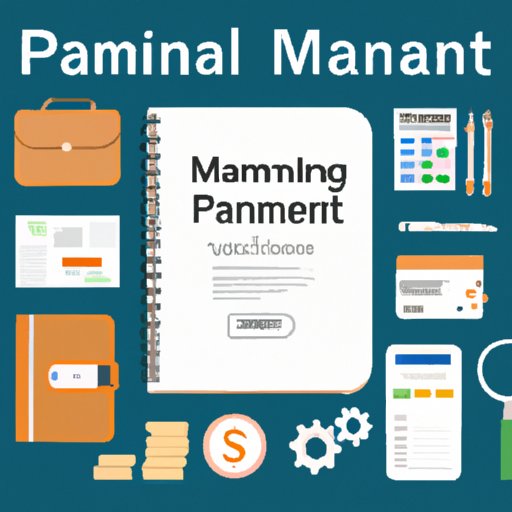Introduction
Personal financial management is an important skill that everyone should have in order to achieve financial success. It involves managing money in a way that will help you reach your short- and long-term financial goals. Personal financial management includes setting budgets, developing plans to reach financial goals, establishing an emergency fund, tracking spending and saving habits, automating payments, avoiding impulse purchases, and creating a financial plan to stick to.
Exploring the Basics of Personal Financial Management
Understanding budgeting and setting goals are two of the most important aspects of personal financial management. Budgeting involves tracking income and expenses and allocating money for different purposes. Setting goals gives you something to work towards and helps you make decisions about how to use your money. Goals can include short-term objectives like saving for a vacation or longer-term goals such as retirement savings. Developing a plan to reach those goals is also key to successful financial management.
Establishing an emergency fund is another important part of personal financial management. An emergency fund is a reserve of money set aside for unexpected expenses or emergencies. Having access to this money can help you avoid taking on additional debt if an unexpected event occurs. Experts recommend having at least three months of living expenses saved in an emergency fund.
Strategies for Implementing Effective Financial Management
Keeping track of spending and saving habits is one of the best ways to ensure that you are making progress towards your financial goals. Automating payments to make sure bills are paid on time is a great way to avoid late fees and penalties. Additionally, avoiding impulse purchases can help you stay on track with your budget and save more money in the long run.

Understanding the Benefits of Financial Planning
Financial planning can be beneficial in many ways. Building wealth and security are two of the main benefits of having a financial plan. Having a plan in place can also reduce stress by giving you a roadmap to follow. Additionally, it can help you achieve financial independence by allowing you to make informed decisions about your money.
How to Create a Financial Plan and Stick to It
Creating a financial plan is the first step to achieving financial success. The key is to set realistic goals that can be achieved over time. Tracking progress and evaluating performance are also important for staying on track with your financial goals. Making adjustments as needed is also key to ensuring that you are staying on track and meeting your goals.

Tips for Staying on Track with Your Finances
Making a budget and sticking to it is one of the best ways to stay on track with your finances. Tracking your expenses can help you identify areas where you may be overspending or under saving. Setting up automatic transfers and reminders can also help you stay on top of payments and avoid late fees and penalties.

The Pros and Cons of Different Financial Management Styles
The DIY approach is a popular option for those who want to manage their own finances without the help of a professional. This approach requires a certain degree of knowledge and understanding of financial concepts. Professional or advisor-assisted approaches involve working with a financial planner or advisor who can provide guidance and advice when it comes to managing finances. Robo-advisors are computer algorithms that provide automated advice based on data provided by the user. Each approach has its own pros and cons, so it’s important to consider what works best for your individual situation.
What Does it Take to Become a Financial Manager?
Becoming a financial manager requires a certain level of education and certifications. A bachelor’s degree in finance or accounting is often required, as well as a certification from a professional organization. The skillset and experience required to become a financial manager vary depending on the position and industry. Networking and support from mentors and colleagues are also key to success in the field.
Conclusion
Personal financial management is an essential skill for individuals who want to achieve financial independence. Understanding budgeting and setting goals, developing a plan to reach financial goals, establishing an emergency fund, tracking spending and saving habits, automating payments, avoiding impulse purchases, and creating a financial plan are all important components of personal financial management. Becoming a financial manager requires a certain level of education, certifications, and experience. By following these tips and strategies, you can create a financial plan that will help you reach your goals and achieve financial success.
(Note: Is this article not meeting your expectations? Do you have knowledge or insights to share? Unlock new opportunities and expand your reach by joining our authors team. Click Registration to join us and share your expertise with our readers.)
